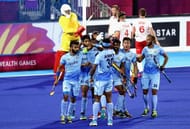India were once a household name in the world of field hockey. Anybody with an iota of sense would think twice before challenging their might on the field. The sense of fear wasn't misplaced either. This team had won six consecutive Olympic gold medals, and their team spirit, as well as individual skills, could give any seasoned player a run of their money.
More than six decades later, Team India is a far cry from their golden days. However, though down, they're not out. Gone are the days when we had to bear the humiliation of not even making it to the Olympics. As we talk of the moment, India is now once again an Asian powerhouse in field hockey, the only Asian team to be in the current top 6 of the FIH world rankings.
Only two years ago, we had created history by storming into the finals of the FIH Champions Trophy 2016, and forced an unstoppable Australia to fight it out for the title in the penalty shootout. Had it not been for a clumsy defense, India could've ended its Olympic drought at Rio 2016, where they stood a clear chance to win an impressive medal, irrespective of the color.
As India prepares for the final edition of the FIH Champions Trophy 2018, this is the last chance to make themselves count. Since 1994, no Asian country has won a major world title, and India would like to break that jinx with their first and last Champions Trophy victory.
Team India: Never say die

The thing that impresses the world about Team India is their never say die spirit. Despite being against all odds more than once, India just refuses to give up. India had barely managed to scrape into the top 10 at the FIH World Cup, with a measly 9th position. But the moment they won their only 3rd gold medal at an Asian Games, in Incheon 2014, it was the beginning of a journey, from where they never looked back.
Today, India is one of the undisputed powers in Asian hockey once again. Barring the exception of South Korea, there is practically no team who can even rise to their status. From the gold in Asian Games, to the recent victory in Asia Cup 2017, India has almost cemented its place in Asian hockey.
Chances at the Champions Trophy
The final Champions Trophy edition at Breda, Netherlands, however, will test the new Indian team's strength, and will also test the excellence of their new coach, Harendra Singh. The previous tournament, i.e. the Gold Coast Commonwealth Games, wasn't a swansong for India, who finished for the first time outside the medal bracket since Melbourne 2006.
Coach Harendra, who was then leading the women's team, didn't fare better either, but given that the women's team hadn't reached the final 4 since the last 12 years, their 4th place finish wasn't the worst thing either.
However, now that coach Harendra is back at the job he cherished, it will be a blast if he leads India to their first and only victory at the FIH Champions Trophy. Though it's not an easy game, given the likes of teams like Australia, Olympic champions Argentina, and Netherlands in tow, it would be a surprise if India is knocked out of medal contention under the very coach who gave India their first Junior Hockey World Cup in 15 years.
Can India make it?

While it's too early to say it, India has a solid chance of repeating its feat of 2016 once again, if it sets the equations right at the Champions Trophy, which will begin from 23rd June onwards.
In order to make it to the finals, India must win at least three of its five matches, and for that, they need to at least beat the likes of Belgium, Netherlands and Pakistan to stay in contention. Even if India secures a draw against Argentina after 3 wins, it's still enough to get into the finals. If they want to vanquish Australia, they need to go out all guns blazing, and who better than coach Harendra and goalkeeper cum captain P R Sreejesh to inspire them.
It was under Sreejesh that India managed to clinch the silver medal for the first time in the last edition. As such, a Champions Trophy win will heavily inspire them for their next major task, the Jakarta Asian Games, where Team India will fight for the first direct ticket to the Tokyo Olympics, 2020.
